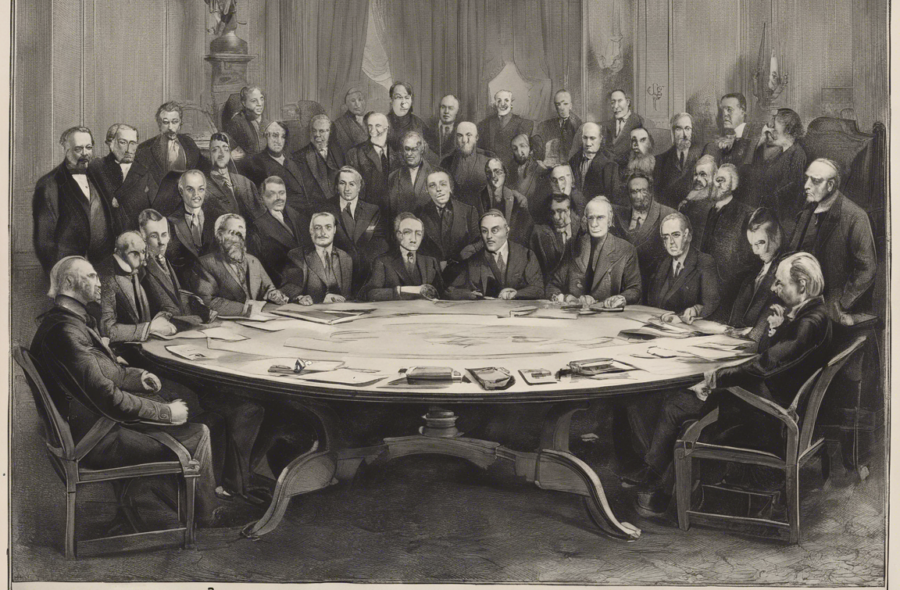The First Round Table Conference held in the 1930s in London was a significant event in India’s struggle for independence from British colonial rule. This conference, which took place from November 1930 to January 1931, aimed to discuss constitutional reforms and find a solution to the political deadlock in India. The conference was attended by a diverse group of participants representing various interests and perspectives. Let’s delve into the key participants and their roles during the First Round Table Conference:
Participants of the First Round Table Conference:
1. Mahatma Gandhi
- Role: The prominent leader of the Indian National Congress, Gandhi played a vital role in advocating for India’s independence through non-violent means. However, he withdrew from the conference as the British government failed to invite other major political figures.
2. Vallabhbhai Patel
- Role: A prominent leader of the Indian National Congress, Patel played a crucial role in organizing the conference and representing the Congress’s views in Gandhi’s absence.
3. M. A. Jinnah
- Role: Representing the Muslim League, Jinnah advocated for the rights of Muslims in India and pushed for a separate electorate for Muslims.
4. B. R. Ambedkar
- Role: As the leader of the Dalit community, Ambedkar participated in the conference to address the concerns and rights of the marginalized communities in India.
5. Tej Bahadur Sapru
- Role: A prominent lawyer and leader, Sapru participated in the conference to represent the interests of the liberal and moderate factions in Indian politics.
6. Srinivasa Sastri
- Role: Representing the Liberal Party of India, Sastri participated in the conference to present the party’s views on constitutional reforms and political representation.
7. Madan Mohan Malaviya
- Role: An educationist and politician, Malaviya participated in the conference to advocate for Hindu-Muslim unity and promote the interests of the Indian National Congress.
8. T. R. Srinivasan
- Role: Representing the Justice Party of India, Srinivasan participated in the conference to voice the concerns and demands of the non-Brahmin communities in South India.
Key Agendas and Outcomes of the First Round Table Conference:
-
Discussion on Constitutional Reforms: The conference focused on discussing constitutional reforms in India and finding a common ground between the British government and Indian political leaders.
-
Representation of Different Communities: Various communities and political factions were represented at the conference to ensure a comprehensive dialogue on India’s future political structure.
-
Failure to Achieve Consensus: Despite extensive discussions, the conference failed to reach a consensus on key issues, leading to a deadlock in the negotiations.
-
Subsequent Conferences: The First Round Table Conference set the stage for further discussions and subsequent conferences to address the political impasse in India and pave the way for eventual independence.
Frequently Asked Questions (FAQs):
- Why was the First Round Table Conference significant in India’s freedom struggle?
-
The First Round Table Conference provided a platform for Indian leaders to discuss constitutional reforms and pave the way for eventual independence from British colonial rule.
-
Why did Mahatma Gandhi withdraw from the First Round Table Conference?
-
Gandhi withdrew from the conference as the British government failed to invite other major political figures, leading to concerns about the inclusivity of the discussions.
-
What were some of the key outcomes of the First Round Table Conference?
-
The conference highlighted the diverse perspectives and interests within Indian society and laid the groundwork for subsequent discussions on constitutional reforms and political representation.
-
How did the participation of different communities impact the First Round Table Conference?
-
The representation of various communities and political factions provided a comprehensive understanding of the challenges and aspirations of different groups in India, shaping the course of the discussions.
-
What role did B. R. Ambedkar play in the First Round Table Conference?
- Ambedkar participated in the conference to address the concerns and rights of the marginalized Dalit community in India, advocating for their representation in the political process.
The First Round Table Conference in the 1930s marked a crucial chapter in India’s journey towards independence, bringing together diverse voices and perspectives to shape the future of the nation. Despite the challenges and setbacks faced during the conference, it laid the foundation for future discussions and negotiations that ultimately led to India’s independence in 1947.

